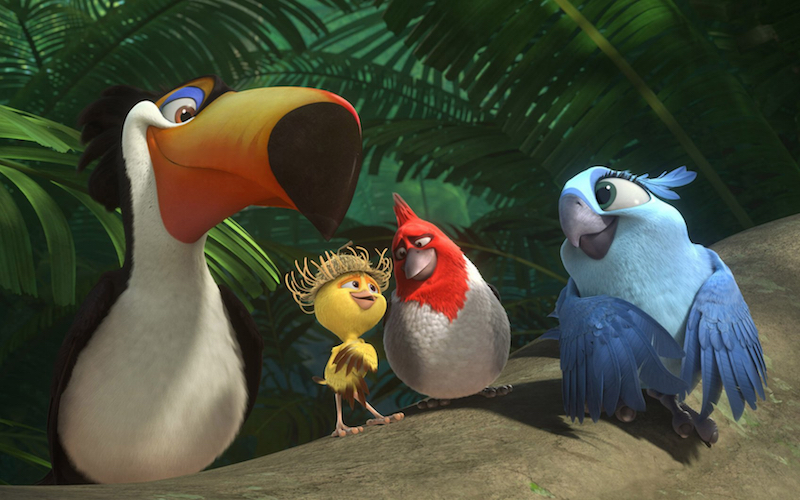
‘Rio 2’: John Powell’s New Winged Symphony
Hollywood film composer John Powell is supremely gifted in conveying musically the romance of flight. In a recent interview, Powell mused, “They used to say ‘If it flies, get Ron Goodwin.’ I am beginning to feel a bit like that myself now, now that I’ve done Dragon, Chicken Run and Rio. Everything is flying.” Whereas the late British composer Ron Goodwin excelled in writing military aviation cues for war films, John Powell has a reputation for describing symphonically the thrill of civil flight.
Powell’s masterpiece in this regard is undoubtedly How to Train Your Dragon (2010), a rollicking musical tribute to Viking dragon-riders and all those who aspire to the high-altitude sport. With brassy bluster, Scottish accents, and sleigh bells, Powell memorializes the film’s culturally taboo friendship between dragon and boy. The score is a classic of orchestral composition that has seen live performance in London and Vienna.
Powell’s latest entry to the music of flight, Rio 2 (2014), fails to match the artistry of Dragon. But the Brazilian flavor of the tale allows the composer to incorporate jubilant and spritely native rhythms within a traditional symphonic landscape. And the brouhaha birds at the heart of the film make for bouncy music.
On the Sony Classics label Rio 2 album currently available through Amazon, the score begins with a new version of the 20th Century Fox Fanfare—rejiggered to a samba beat complete with carnival whistles.
The first full track, “Batucada Pagode,” dances to a Brazilian vocal chant. It serves as a kindhearted and sassy introduction to the world of the film. The guitars sound as delicate as ukuleles. The main melody appears throughout the film, perhaps signaling the forces of fun and feathery mayhem.
“Traveling Family” features a jaunty, fun rhythm and a catchy woodwind melody that evoke a gaggle of giggling birds in the tropics.
“Sideshow Freaks” jumps from theme to theme. One is a party tune led by the accordion—a key instrument in the forró music of northeastern Brazil.
“Escorting the Clan” includes what is perhaps the most beautiful melody of the picture, announced at the 2:48 mark in the track. It’s a slow, romantic strings riff that evokes dignity and royalty. Toward the end of the track, Powell reiterates the theme with bulkier instrumentation and fanfare, producing a magical crescendo. The elegance of the melody is conspicuous within a score full of frantic, bird-brained motion.
This romantic melody returns in the climatic “Battle for the Heart of the Forest,” before the score concludes with what sound like actual bird calls.
Overall, the fiery, carnival spirit promised by the revised 20th Century Fox fanfare is never quite fulfilled by the rest of the score. The individual Brazilian collaborators on Rio 2—UAKTI, Carlinhos Brown, Barbatuques, et al—give soulful performances. Had the highlight themes on album been more fully developed by the composer, the score might have felt more unified and powerful. Given more length, the main themes could have benefited from judicious musical counterpoint.
But making these judgments on film composers is difficult given the collaborative nature of Hollywood music composition, where directors and composers work side-by-side in “spotting” sessions that decide where music should go in a picture. Creative control can vary widely across the gamut of director-composer partnerships. Even long-standing collaborations like Tim Burton-Danny Elfman have seen tension.
Regardless of Rio 2’s faults, Powell has a bright future ahead as a composer. He has a keen sensitivity for the musical direction of animated feature films as well as live-action ones.
Film music enthusiasts and fans of high-quality animated mythology are waiting with great anticipation for the release of How to Train Your Dragon 2 in June. The sequel score promises to restate some of the classic themes of the original. “It uses some of the same tunes but there are also lots of new tunes,” says Powell. “We have a big choir, a big orchestra. Everything is the same but it has a new set of characters and a whole new story. The characters have grown up since the last film so things are slightly different. It’s a maturation story.”
Powell is currently planning a sabbatical from film scoring to work on concert music, including a 45-minute oratorio devoted to the 100-year anniversary of World War I, but when he returns, he can surely expect a hero’s welcome from fans.
